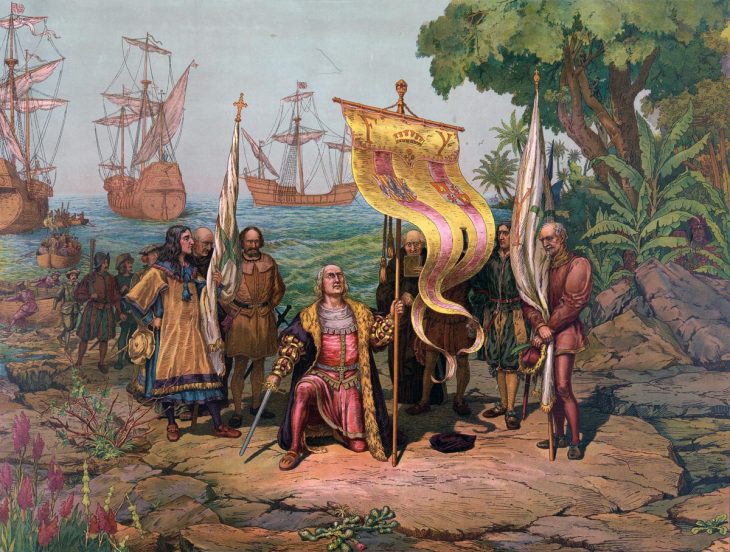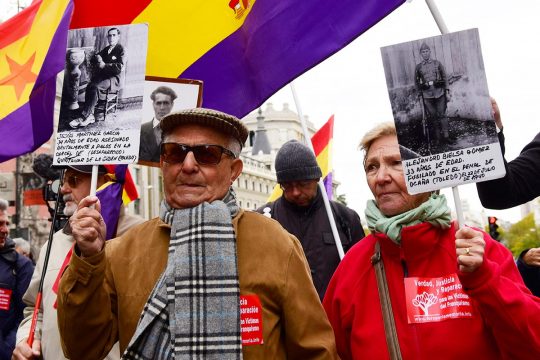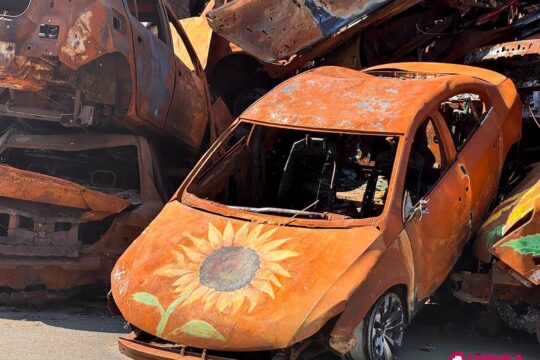The controversy began with a symbolic dismantling. On November 10, the statue of Christopher Columbus in a Los Angeles park was removed under the eyes of a large crowd. The initiative came from a group led by local official Mitch O'Farrell, who is descended from an Oklahoma indigenous population. This tearing down of the first Western colonizer of the Americas coincided with a day of celebration for the Amerindian peoples. The statue was placed there in 1937 by Italian Americans, for whom the Genoese sailor was a symbol of pride in their identity and who have since celebrated their icon every year in October. The reason cited for dismantling the statue was that Columbus was a "genocide perpetrator" who wanted to exterminate indigenous populations.
“Negative myths”
Spain is not directly targeted by this event intended to be a "historical reparation". But the controversy immediately spread to Spain, from which Columbus departed and which, together with Portugal, was the great colonial power in the Americas. To understand Spanish feelings about the Italian sailor, it is enough to see how much he is present in the country’s history and how many squares, streets, organizations and buildings are named after him. Barcelona's main avenue, for example, has a large Columbus Monument at its lower end, whilst one of Madrid's largest squares is called "Plaza Colón" and features a huge red and gold national flag. It is also on this square that big patriotic gatherings take place, including those that exalt Spanish nationalist sentiment in the face of the Catalan separatist challenge.
The issue is complex and questions even today how Spain sees its “black legend”, a negative perception of Spanish history born in the 16th century and associating the country with intolerance, religious fanaticism and obscurantism. A recent trend amongst some Spanish historians is to dismantle these negative myths. There is, for example, historian María Elvira Roca Barea’s very successful book “Imperiofobia y Leyenda Negra” (Siruela, 2016), which denies accusations of genocide and argues that most of the deaths during the colonial era in the Americas were due more to epidemics than swords. It also accuses several Western countries including Italy and the Netherlands of having contributed to the “stigmatization of Spain”.
Double standards?
By questioning the figure of Columbus (paradoxically not Spanish), it is the very root of the American colonization that is being attacked. Historians overwhelmingly refute the accusation of "genocide" behind the Los Angeles statue dismantling. "This charge is meaningless," says Pablo Emilio Pérez-Mallaína, professor of Americas history at the University of Seville. "We cannot speak of genocide, since Columbus never wanted to exterminate an entire race, including because he needed it as a labour force." Almost no one in Spain is attacking the figure of Columbus either politically or symbolically, or considering any revisionist approach that would taint his memory. Some Catalan separatists, who like to distance themselves from Spain, are even trying to claim the sailor for their own, saying that he was Catalan and that his real name was Cristòfor Colom.
Against this controversy, however, two historiographic trends are at work. The first is the result of forty years of Franco's dictatorship for which Christopher Columbus's actions in 1492 were comparable to Caudillo's coup d'état in July 1936. These historians try to minimize his mistakes and praise his supposed merits. In the aftermath of the Los Angeles move, the leader of the Popular Party (right, PP), Pablo Casado, sought to reaffirm Columbus's emblematic strength by referring to his conquest as "one of the great events in the history of humanity, comparable to the Romanization of the Mediterranean". Enrique Moradiellos, who won the national history prize in 2017, does not share this vision of singing his praises but sees in the Los Angeles episode (and the fact that about 50 cities in the United States have renamed Columbus Day "Indigenous People's Day") an "act of hysteria". "Removing the statue of Columbus is a cultural aggression," he says. "Why don't they take down statues of Jefferson or Washington for their links with slavery?”
The dark side of Columbus
The other trend amongst historians, which is currently in the majority, considers that with globalization, memory should naturally be revisited and revised from other points of view. Historian Antonio Espino López of Barcelona Autonomous University believes, for example, that "even if he did not seek to exterminate, Columbus opened an era of mass killings in the New World". History professor Carlos Martínez Shaw is also in favour of a re-reading of the myth. "Let us not forget the dark side of Columbus,” he says. “Both in his time and after him, the Conquistadors came across populations they sometimes massacred or attacked because they were legitimately trying to defend themselves." As the leading Spanish daily El País said in an article about the debate on the country's past, "Columbus is not dead".
WANTED: 15TH CENTURY SPANISH JEWS WISHING TO BE SPANISH AGAIN
In October 2015, the Spanish government of Mariano Rajoy announced a new law to facilitate acquisition of Spanish nationality by descendants of Sephardic Jews expelled in 1492 by Catholic Queen Isabel. Up to then, any candidate was required to have lived in Spain for at least two years and renounce his or her previous nationality. These two conditions have now been dropped. Five centuries after Jews were expelled from Spain – they were made to choose between leaving or converting to Catholicism if they did not want to end up in the fires of the Inquisition –, Spanish authorities say their new generosity is a sign of historical repentance towards “a population that should never have been mistreated in this way”.
Three years later, however, this generosity by modern Spain does not seem to have met with much success. Whereas there are some 3.5 million Sephardic Jews in the world and an estimated 90,000 meeting the criteria, by mid-November 2018 only 3,843 people had obtained Spanish nationality whilst 5,682 other cases were being processed. This is not much given that there has always been a strong “dream of Spain” among the Sephardic community. Madrid has therefore decided to extend the deadline, initially set for October 2018. Reasons for the low level of naturalizations include the cost of the process (5,000 Euros on average), administrative requirements (presenting oneself personally before a lawyer, having the names and certificates to prove one’s lineage) and cultural requirements (good written and spoken Spanish, knowledge of the country’s politics etc.). And so what was supposed to be access to nationality as a symbolic reparation seems to have been taken up mainly for economic reasons: the main beneficiaries of the new legislation come mainly from Turkey and Venezuela.






